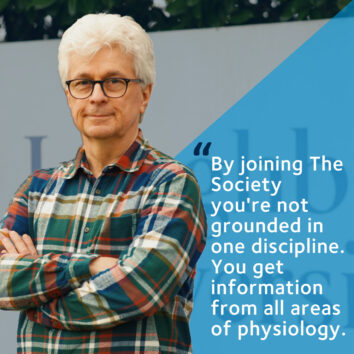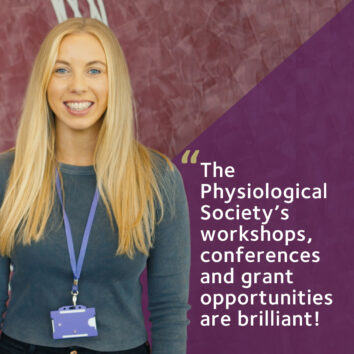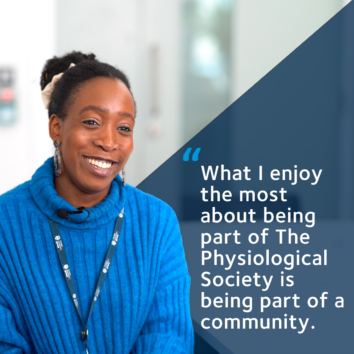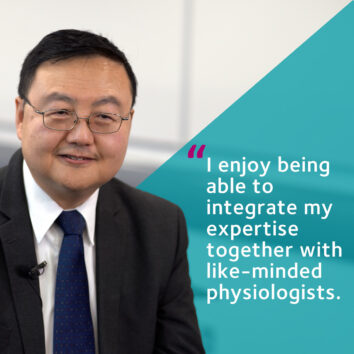

Dr Colleen Deane
The Physiological Society are great for offering fellowships for early career researchers like myself to try and springboard their career and help establish their independent lab.
Career journey
Dr Colleen Deane is a lecturer in Muscle Cell Biology, particularly interested in how exercise, nutrition, ageing and spaceflight/disuse impact skeletal muscle health. Dr Deane’s PhD focused on understanding the metabolic and molecular mechanisms underpinning muscle regeneration following exercise in youth and older age. Since she has completed multiple post-doc positions, first investigating the impact of NAD+ precursor supplementation on muscle and mitochondrial health in older adults and the second investigating the mechanisms of and countermeasures to spaceflight-induced muscle decline, which involved sending worms into space as part of the first UK-led experiment to the International Space Station (ISS) – the Molecular Muscle Experiment (MME). Realising the gap of traditional physiologists being able to handle ‘big data’, Dr Deane was awarded a three-year MRC fellowship to develop her own bioinformatic skills to investigate the transcriptional basis of skeletal muscle atrophy and hypertrophy. Colleen was also part of the science team that conducted a second experiment on the ISS, the MME2.

Hear from Dr Colleen Deane
Questions and Answers
What inspired you to work and/or study physiology?
This really goes back to when I was at school. I was very interested in sports and engaging in exercise, but I also really loved biology as a lesson. So I was really interested in understanding how the body works and also how it can respond and adapt to certain situations.
What inspired you to join The Physiological Society?
This was actually a mentor of mine. So when I first started my PhD my supervisor at the time, Dr Tim Etheridge, who’s at the University of Exeter, suggested that I should join The Physiological Society because of the numerous benefits that it offers.
What do you enjoy the most about working in physiology?
Being honest, is actually engaging with my research participants. So a lot of what I do is running clinical trials or human physiology trials to understand how an intervention may influence muscle health.
What’s been the most exciting part of your career?
This is certainly being involved in the first UK led experiment to the International Space Station. Called the Molecular Muscle Experiment.
What’s been the biggest challenge in your career?
The biggest challenge for me working in physiology, I think certainly relates to funding. It’s very hard out there to get the funding for what you want to do and the research that you need to do to answer your questions. However, The Physiological Society are great for offering fellowships for early career researchers like myself to try and springboard their career and help establish their independent lab.
How has being a member of The Society benefited your career?
The Society has benefited my career in so many ways. One of these is through travel grants. I was also involved in the spaceflight animation related to how your body adapts to being in space.
Why do you think physiology is important as a career and in the future? How do you feel physiology or your area of research has an impact on the world?
Physiology underpins all of life. Skeletal muscle accounts for about 50% of our body weight, and it’s really critical for things like moving and also for our metabolism. So it’s really important that we maintain a healthy muscle mass across the life course. And muscle weakness actually costs £2.5 billion every single year in the UK alone.
What do you enjoy the most about being a part of The Society?
For me being part of The Physiological Society has benefited my career in so many ways through travel grants, through networking, through attending conferences. But The Society also offer things like opportunities to get involved in policy. And all of these things are really critical to having a really successful career in physiology.
What would you say to others looking to join The Society?
For anyone looking to join The Society, I say do it.
Timeline
2008-2011
B.Sc. Sport and Exercise Science
2011-2012
M.Sc. Physical Activity, Nutrition & Health Promotion
2012-2017
Ph.D. Muscle Physiology
2017
Young Life Scientists Symposium
2015-2016
Research Assistant, University of Birmingham, UK
2016 – 2019
Post-doctoral Research Fellow, University of Exeter, UK
2019
The Physiological Society: Space Physiology Animation
2019-2022
MRC Skills Development Fellow, University of Exeter, UK
2020
The Physiological Society, “Let’s get physiological” podcast
2021
Experimental Physiology Senior Editor
Experimental Physiology Reviewing Editor
2022
The Physiological Society, “Let’s get physiological” podcast
The Physiological Society Rep
2022- onwards
Lecturer in Muscle Cell Biology, Uni of Southampton
Dr Colleen Deane

Timeline
2008-2011
B.Sc. Sport and Exercise Science
2011-2012
M.Sc. Physical Activity, Nutrition & Health Promotion
2012-2017
Ph.D. Muscle Physiology
2017
Young Life Scientists Symposium
2015-2016
Research Assistant, University of Birmingham, UK
2016 – 2019
Post-doctoral Research Fellow, University of Exeter, UK
2019
The Physiological Society: Space Physiology Animation
2019-2022
MRC Skills Development Fellow, University of Exeter, UK
2020
The Physiological Society, “Let’s get physiological” podcast
2021
Experimental Physiology Senior Editor
Experimental Physiology Reviewing Editor
2022
The Physiological Society, “Let’s get physiological” podcast
The Physiological Society Rep
2022- onwards
Lecturer in Muscle Cell Biology, Uni of Southampton


